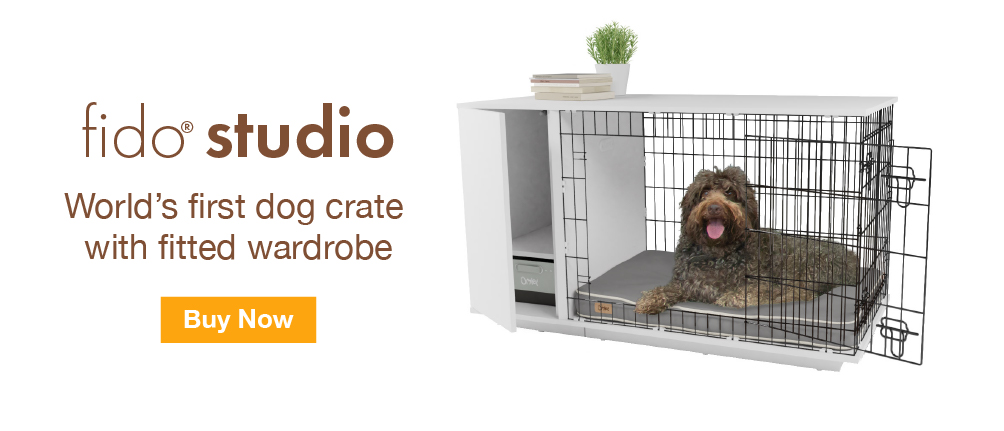When it comes to our furry companions, ensuring they receive a well-rounded diet is paramount for their health and happiness. While commercial dog food remains a staple, there's more to a dog's nutritional needs than just kibble. But what else should dogs eat?
Balanced diet
A balanced diet is the cornerstone of a dog's health. Just like humans, dogs require a diverse array of nutrients to thrive. A proper balance of proteins, fats, carbohydrates, vitamins, and minerals is crucial for their growth, energy, and immune system. But there are more choices than just dry dog food or wet dog food to choose from. Besides their regular meals, there are some foods that can elevate, or depreciate, their diet so let’s take a look at what else you should (or should not) feed your dog.

Feed your dog a healthy, balanced diet using Omlet’s stylish, anti-topple dog bowls.
Dog bones
While bones might seem like a natural treat for dogs, certain types can pose serious risks. Eating bones is instinctive in dogs, but it’s vital that you consider your dog’s health when satisfying their craving. Cooked bones, especially from poultry or fish, are a hard “no” for dog treats. Not only can cooked bones cause lots of damage to your dog’s mouth - broken teeth, bleeding gums and a cut tongue - but the broken bits can get stuck in your dog’s throat, stomach and intestines causing horrible injuries. Never feed cooked bones to your dog.
Raw poultry bones, on the other hand, such as necks and wings, make highly nutritious snacks for a dog. These special treats can be given to your pup on occasion so long as they remain raw and uncooked. Chewing on a raw bone can actually aid in cleaning and strengthening a dog’s teeth. But just remember the golden rule when it comes to any animal bone as dog treats – raw is good, cooked is bad.
Eggs for dogs
Eggs are a nutritional powerhouse for dogs. They're packed with protein, vitamins, and minerals, making them a yummy and healthy treat for your canine companion. The essential amino acids of eggs can do wonders for your dog’s coat and skin.
But can dogs eat eggs that are both cooked and raw? The quick answer is to stick to cooked eggs when treating your dog. There’s always a risk of salmonella with raw eggs and it’s a risk better to avoid than consider. Scrambled or hard-boiled eggs without any seasoning are a fantastic occasional addition to your dog's diet.
Fish for dogs
Fish is an excellent source of omega-3 fatty acids to treat your dog. This protein-packed palette pleaser helps to promote a healthy coat, skin, and joints in dogs. But before cooking up your dog’s favourite meal from the sea, be sure the fish is fully cooked to avoid any potential parasites. Fish such as salmon and sardines are particularly beneficial due to their high omega-3 content, so long as the bones are removed and the fish is cooked before feeding it to fido.
Grains/cereal/rice for dogs
Dogs are omnivores which means they eat foods that are both plant and meat-based. Commercial dog foods, however, tend to contain mostly grains in their ingredients. While consuming grains like rice or cereal can be a perfect part of a dog's diet, it’s important to make sure it’s not the only thing in their diet.
Grain-heavy diets for dogs can have a negative impact on their health if sustained for too long. You might notice that a dog on a grain-based diet eats a lot and never seems full. That’s because a large percentage of those nutrients come out the other end! Heavy grain foods have a very low nutritional value so they end up passing right through without passing along much on the way. Dogs need meat substitutes included in their meals in order to remain strong and active, so it’s best to always add some cooked fish or eggs to sporadic meals to keep your dog healthy.

Omlet dog bowls are dishwasher safe and super easy to clean, perfect for serving food and water to your pet.
Boiled chicken and rice for upset stomachs in dogs
While it’s possible for any pup of any age to get an upset stomach, puppies are usually more susceptible to tummy aches. Giving your dog bland food can help settle their stomachs, though. Most vets recommend boiled chicken and rice as a good soothing remedy as this combo provides easily digestible nutrients. Just be sure to remove the skin and bones from the chicken and cook it thoroughly before mixing it with plain, cooked rice.
Dog treats
Treats are an integral part of a dog's diet, but they should be given sparingly and chosen wisely. Store-bought treats can often be high in fat, sugar, and additives, so it’s best to buy or make natural treats in order to keep your dog’s health in check.
Small pieces of fruits or vegetables, freeze-dried meats, or real-ingredient and specially formulated dog treats all make great options without compromising your dog’s health. Whether you are using treats as a training tool or just as an occasional snack, remember that they are in addition to your dog’s diet and not a main staple.
Omlet and your dog
When it comes to providing a varied and healthy diet for your dog, it's essential to consider the quality of pet products. At Omlet, we offer innovative and high-quality solutions for pet owners so they can keep their dogs both happy and healthy. With products like our well-designed comfy dog beds, furniture-style dog crates, and thoughtfully made dog bowls, our goal is to ensure your furry friend receives the best care possible. So make every meal an adventure for your dog with a diet that goes beyond the bowl, keeping them happy, healthy, and tail-waggingly content.




Comments
There are no comments just yet